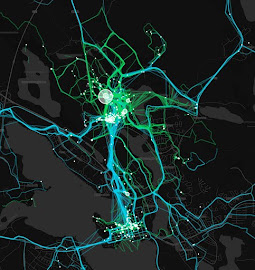I really enjoy the topic for this first two weeks of the ONL course, Online participation and digital literacy.
It is great to work together with the members of my group and to learn more from and together with them. I’m really looking forward to our journey through this course.
I have had to do with online participation and digital literacy for the past 10 years.
In 2010 working as a principal at a secondary school, I had the opportunity to be one of the schools in Luleå who got computers to every student. We were pilots and no one really knew what challenges we were going to struggle so there were a lot of learning by doing. This journey made me very aware of how important digital literacy are for everyone and that it is important to learn the difference between personal and private on the internet.
Who am I as an individual in the digital age? What about my own digital literacy and my identity on the web?
As an individual in the digital age, I´m always curious on knowing more about new technology on the market and I try to be updated on new digital tools and functions. I don´t want to be a consumer of internet and instead I try to be a creator of my own digital environment. It is important for me to understand what are behind the screen and how people can use coding for their own purpose. It is also important for me to know how to create things in an easy way, using different sort of digital tools.
When having knowledge on how to create and control with code, I believe my digital literacy is good, and the knowledge gives me confidence about my digital footsteps and with who I want to share my private thoughts.
I don´t mind being personal at all and share things from my life, and I know my line between personal and private.
There are areas where I have chosen to share private data with companies and that is my position, my DNA, and my health matrices.
Why? I think that my data can make a difference both for me and for others around the world.
As an example, sharing my position on Google gives me opportunities to know how the traffic situation are and to navigate to new places and knowing exactly how long it will take me to get there. My DNA has given me information about my history and the possibility to find relatives around the world. My DNA also gives me information about medical issues related to my genes.
While I´m exercises a lot and care about my health and condition, I enjoy following my health and to see how my body reacts on different sort of activities and food. If this data is used in a good way, it can help learning more about the human body.

In my ONL-group we chosen to concentrate on online participation, and I dug into the question, how to help people from different background and skill levels feel comfortable in a digital classroom/learning environment?
Here at Luleå university of technology I found an interesting research project, “Walk about”, where a 3D environment is designed to be a learning environment. The students and the teacher represent themselves as avatars and can express themselves with animations, movement, text, and voice chat.
During the pandemic, when using a video conference system as the main classroom for the students, many teachers have said that it is hard to get the students to put on the camera and to get them to be engaged in the lecture and ongoing learning activities. I think that if students got the opportunity to have the same lecture in a 3D-environment that works more like the real world, their engagement in the lecture and the learning would increase.
Why? Because first, they don´t have to look at them self all day and when getting into this type of environment, you must leave other distractions out and focus on what is happening in the environment.
Second you can express yourself by selecting avatar and use animations, movement, text, or voice.
Third, this environment erase students’ backgrounds and different difficulties and it is possible for students to participate equally.
Each one i our group had to make a short video, using biteable.com to our group presentation and here is my result:
References:
Developing digital literacies http://web.archive.org/web/20141011143516/http://www.jiscinfonet.ac.uk/infokits/digital-literacies/
White, D. & Le Cornu, A. (2011) Visitors and residents: A new typology for online engagement. First Monday, 16(9).
Parnes, P., Backman, Y. & Gardelli, V. (2021) Game Technologies to Assist Learning of Communication Skills in Dialogic Settings for Persons with Aphasia http://ltu.diva-portal.org/smash/get/diva2:1509268/FULLTEXT01.pdf
Parnes, P., Backman, Y. & Gardelli, V. (2021) Walk about – A net-based interactive multiuser 3D-environment for enhanced and engaging learning.
Tomorrow it is time for our next topic Open Learning – Sharing and Openness, a fun and interesting topic.
See you soon!